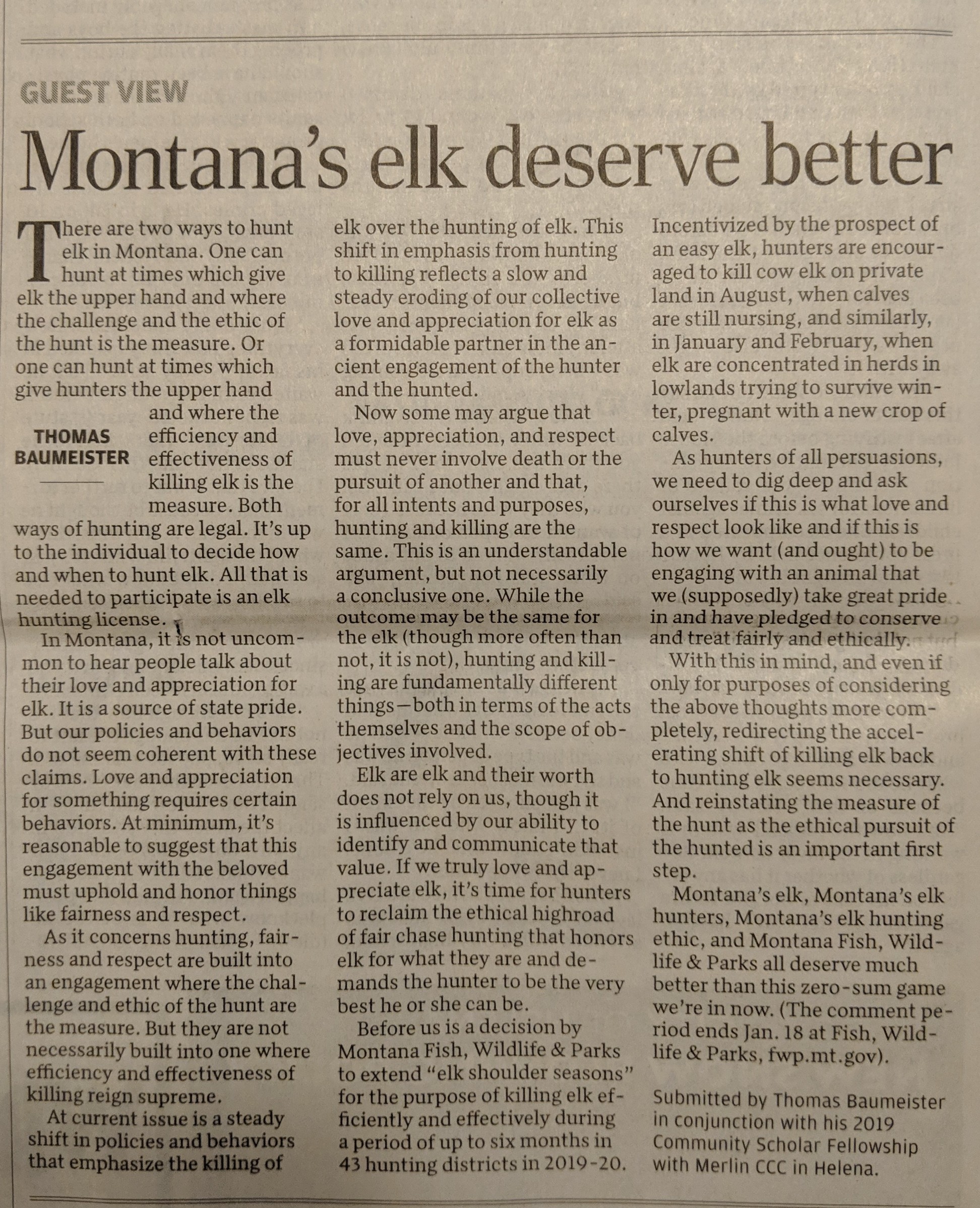
Thomas Baumeister
There are two ways to hunt elk in Montana. One can hunt at times which give elk the upper hand and where the challenge and the ethic of the hunt is the measure. Or one can hunt at times which give hunters the upper hand and where the efficiency and effectiveness of killing elk is the measure. Both ways of hunting are legal. It’s up to the individual to decide how and when to hunt elk. All that is needed to participate is an elk hunting license.
In Montana, it is not uncommon to hear people talk about their love and appreciation for elk. It is a source of state pride. But our policies and behaviors do not seem coherent with these claims. Love and appreciation for something requires certain behaviors. At minimum, it’s reasonable to suggest that this engagement with the beloved must uphold and honor things like fairness and respect.
As it concerns hunting, fairness and respect are built into an engagement where the challenge and ethic of the hunt are the measure. But they are not necessarily built into one where efficiency and effectiveness of killing reign supreme.
At current issue is a steady shift in policies and behaviors that emphasize the killing of elk over the hunting of elk. This shift in emphasis from hunting to killing reflects a slow and steady eroding of our collective love and appreciation for elk as a formidable partner in the ancient engagement of the hunter and the hunted.
Now some may argue that love, appreciation, and respect must never involve death or the pursuit of another and that, for all intents and purposes, hunting and killing are the same. This is an understandable argument, but not necessarily a conclusive one. While the outcome may be the same for the elk (though more often than not, it is not), hunting and killing are fundamentally different things—both in terms of the acts themselves and the scope of objectives involved.
Elk are elk and their worth does not rely on us, though it is influenced by our ability to identify and communicate that value. If we truly love and appreciate elk, it’s time for hunters to reclaim the ethical highroad of fair chase hunting that honors elk for what they are and demands the hunter to be the very best he or she can be.
Before us is a decision by Montana Fish, Wildlife & Parks to extend “elk shoulder seasons” for the purpose of killing elk efficiently and effectively during a period of up to six months in 43 hunting districts in 2019-20. Incentivized by the prospect of an easy elk, hunters are encouraged to kill cow elk on private land in August, when calves are still nursing, and similarly, in January and February, when elk are concentrated in herds in lowlands trying to survive winter, pregnant with a new crop of calves.
As hunters of all persuasions, we need to dig deep and ask ourselves if this is what love and respect look like and if this is how we want (and ought) to be engaging with an animal that we (supposedly) take great pride in and have pledged to conserve and treat fairly and ethically.
With this in mind, and even if only for purposes of considering the above thoughts more completely, redirecting the accelerating shift of killing elk back to hunting elk seems necessary. And reinstating the measure of the hunt as the ethical pursuit of the hunted is an important first step.
Montana’s elk, Montana’s elk hunters, Montana’s elk hunting ethic, and Montana Fish, Wildlife & Parks all deserve much better than this zero-sum game we’re in now. (The comment period ends January 18th at Fish, Wildlife & Parks, fwp.mt.gov).
By Thomas Baumeister in conjunction with his 2019 Community Scholar Fellowship with Merlin CCC.
Prompted by a concern for the state of hunting and conservation and ethical questions regarding the measure of the hunt, fairness, and respect, Thomas offers valuable & important food for thought — for hunters and non-hunters alike. The article is a perfect example of how philosophy reaches beyond the classroom and why asking philosophical questions matter to our everyday lives (and the lives of others), practices, and policies. The above article went live on the Merlin website on Sunday. January 13th, was submitted for consideration as an op-ed to the Helena Independent Record on Monday, Jan. 14th, and appeared as a featured “guest view” article on-line and in print on Thursday, Jan. 17th.

